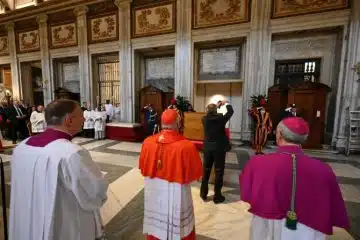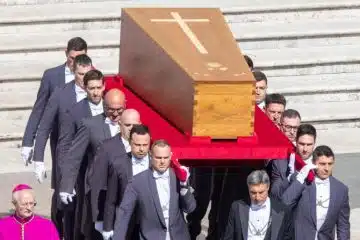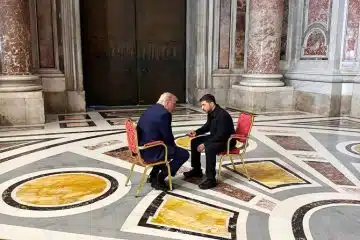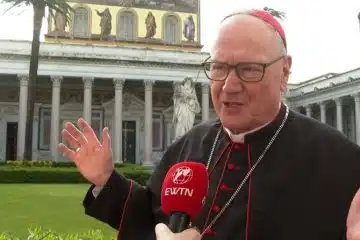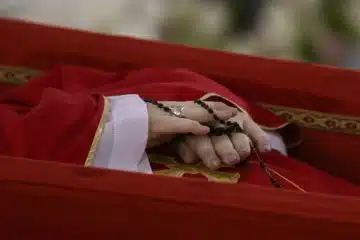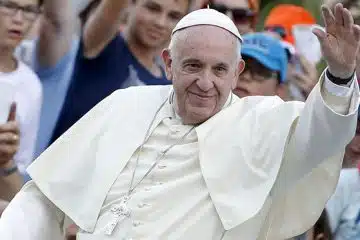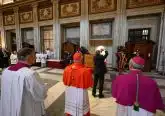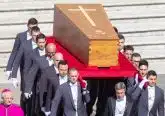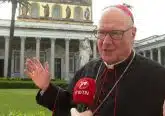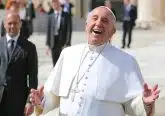Bishops to elect officers, hear task force report, vote on action plan

IMAGE: CNS photo/Jim Lo Scalzo, EPA
By
WASHINGTON (CNS) — The U.S. bishops will discuss ways to promote peace in U.S. communities torn apart by violence, vote on ways to implement priority areas for their conference approved last year and elect new leaders during their Nov. 14-16 fall general assembly in Baltimore.
The discussion about restoring peace in the nation will stem from a report to be presented to the bishops from a task force formed this past summer after shootings by police and of police took place in Baton Rouge, Louisiana; Minneapolis; and Dallas.
When Archbishop Joseph E. Kurtz of Louisville, Kentucky, who is president of the U.S. Conference of Catholic Bishops, announced the USCCB Task Force to Promote Peace in Our Communities, he said there needed to be “ways of nurturing an open, honest and civil dialogue on issues of race relations, restorative justice, mental health, economic opportunity and addressing the question of pervasive gun violence.”
The task force is chaired by Atlanta Archbishop Wilton D. Gregory, who told reporters in September that the U.S. bishops are in beginning stages of developing a pastoral letter that will examine racism in society and the church and will encourage dialogue on the issue as well as describe steps Catholics can take to bring about healing and reconciliation.
As part of the USCCB’s 2017-2020 strategic plan, the bishops will discuss and vote on an action plan to support the five priorities they approved last November: evangelization; family and marriage; human life and dignity; religious freedom; and vocations and ongoing formation.
They also will be given an update on preparations for the convocation of Catholic leaders from all across the country taking place next July in Orlando, Florida, and focusing on “The Joy of the Gospel in America.” It is an initiative of bishops’ Working Group on the Life and Dignity of the Human Person.
The bishops will convene key leaders from dioceses and Catholic organizations from across the country “to assess the challenges and opportunities of our time,” particularly in the context of the U.S. Catholic Church, according to the USCCB.
Inspired by Pope Francis’ 2013 apostolic exhortation, “Evangelii Gaudium” (“The Joy of the Gospel”), the convocation “will form leaders who will be equipped and re-energized to share the Gospel as missionary disciples,” the USCCB said.
Archbishop Kurtz will give his final address as USCCB president; his three year-term ends at the conclusion of the fall assembly. Also ending his three-term is the current vice president, Cardinal Daniel N. DiNardo of Galveston-Houston.
During their meeting, the bishops will elect a new president and vice president, whose three-year terms will begin at the conclusion of the assembly. Each office is elected from a slate of 10 candidates who have been nominated by their fellow bishops.
The nominees are: New Orleans Gregory M. Aymond; Philadelphia Archbishop Charles J. Chaput; Oklahoma City Archbishop Paul S. Coakley; Cardinal DiNardo; Texas Bishop Daniel E. Flores of Brownsville; Los Angeles Archbishop Jose H. Gomez; Baltimore Archbishop William E. Lori; Detroit Archbishop Allen H. Vigneron; Miami Archbishop Thomas G. Wenski and New Mexico Archbishop John C. Wester of Santa Fe.
USCCB bylaws provide that the first election is that of the president by simple majority vote of members who are present and voting. Following the election of the president, the vice president is elected from the remaining nine candidates.
In either election, if a candidate does not receive more than half of the votes cast on the first ballot, a second vote is taken. If a third round of voting is necessary, that ballot is a run-off between the two bishops who received the most votes on the second ballot.
During the meeting, the bishops also will vote for new chairmen-elect of the following five USCCB committees: Committee on Canonical Affairs and Church Governance; Committee on Ecumenical and Interreligious Affairs; Committee on Evangelization and Catechesis; Committee on International Justice and Peace; and Committee on the Protection of Children and Young People. They serve one year as chairmen-elect and then over as chairmen at the conclusion of the bishops’ fall assembly in 2017.
The nominees are:
— Canonical Affairs and Church Governance: Bishops Robert P. Deeley of Portland, Maine, and David M. Malloy of Rockford, Illinois.
— Ecumenical and Interreligious Affairs: Bishops Joseph C. Bambera of Scranton, Pennsylvania, and Michael C. Barber of Oakland, California.
— Evangelization and Catechesis: Auxiliary Bishop Robert E. Barron of Los Angeles and Bishop Frank J. Caggiano of Bridgeport, Connecticut.
— International Justice and Peace: Bishop Robert W. McElroy of San Diego and Archbishop Timothy P. Broglio of the U.S. Archdiocese of the Military Services.
— Protection of Children and Young People: Bishops Timothy L. Doherty of Lafayette, Indiana, and Joseph J. Tyson of Yakima, Washington.
– – –
Copyright © 2016 Catholic News Service/U.S. Conference of Catholic Bishops. www.catholicnews.com. All rights reserved. Republishing or redistributing of CNS content, including by framing or similar means without prior permission, is prohibited. You may link to stories on our public site. This copy is for your personal, non-commercial use only. To request permission for republishing or redistributing of CNS content, please contact permissions at [email protected].


